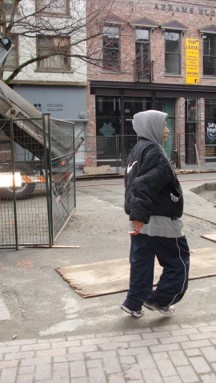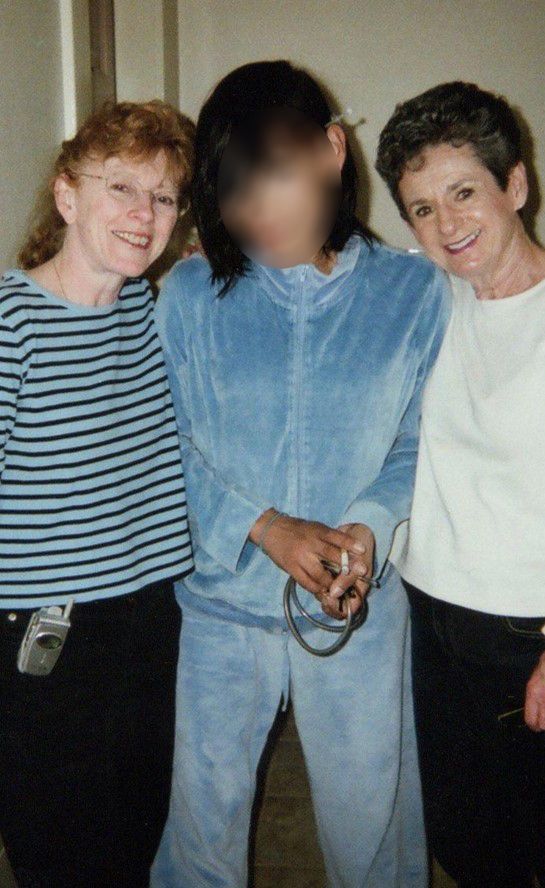ABC: DEVELOP A TRUSTING RELATIONSHIP

The Challenge

Our work consisted of something like this…..Here is the story of Gene:
We first met Gene in 15 years ago. Her street dad, Garrard an older man himself dealing with HIV disease and on dialysis for kidney failure, was very concerned about her. She was not doing well. She appeared depressed, withdrawn and difficult to engage. When we visited her, there were many bottles of untaken ARVs in her room. We introduced her to Dr Sue Burgess. It was decided to start her on a trial of vitamins pre-poured in a dosette. We visited her weekly to monitor her adherence. That was all she would tolerate at that point.
Eventually, a once a day regimen was started. She did well for a while but then things unraveled. She stopped taking any meds. She lost her housing and moved in with Bernie. She soon developed severe pain in her Left hip and was hospitalized for 3 months with a severe infection needing surgery to remove most of her hip. She was to be non weight bearing forever and left hospital with a wheelchair. Soon after discharge, Bernie died. Gene developed a major depression. She withdrew from us and stopped her meds.
Gene eventually met a new boy friend, Gary. She moved in with him and stabilized somewhat. We were able to visit her daily and give her meds but that didn’t last long. They developed drug debts and fear for their lives, leaving them homeless for 4 months. Through the months we were able to find her most days in a blue tent that they moved from place to place to escape the police. She remained successfully on ARV therapy.
That was 4 years ago. Today, well there is still no cure for HIV disease although it can become a chronic manageable disease with life saving medications.But for our folks it is a major challenge to remain on ARV meds successfully. The concept of daily meds for the rest of your life does not fit with the chaotic lifestyle they lead.
We first met Gene in 15 years ago. Her street dad, Garrard an older man himself dealing with HIV disease and on dialysis for kidney failure, was very concerned about her. She was not doing well. She appeared depressed, withdrawn and difficult to engage. When we visited her, there were many bottles of untaken ARVs in her room. We introduced her to Dr Sue Burgess. It was decided to start her on a trial of vitamins pre-poured in a dosette. We visited her weekly to monitor her adherence. That was all she would tolerate at that point.
Eventually, a once a day regimen was started. She did well for a while but then things unraveled. She stopped taking any meds. She lost her housing and moved in with Bernie. She soon developed severe pain in her Left hip and was hospitalized for 3 months with a severe infection needing surgery to remove most of her hip. She was to be non weight bearing forever and left hospital with a wheelchair. Soon after discharge, Bernie died. Gene developed a major depression. She withdrew from us and stopped her meds.
Gene eventually met a new boy friend, Gary. She moved in with him and stabilized somewhat. We were able to visit her daily and give her meds but that didn’t last long. They developed drug debts and fear for their lives, leaving them homeless for 4 months. Through the months we were able to find her most days in a blue tent that they moved from place to place to escape the police. She remained successfully on ARV therapy.
That was 4 years ago. Today, well there is still no cure for HIV disease although it can become a chronic manageable disease with life saving medications.But for our folks it is a major challenge to remain on ARV meds successfully. The concept of daily meds for the rest of your life does not fit with the chaotic lifestyle they lead.
How were we able to tell you earlier that Gene was still alive?
3 reasons:1. Treatments have improved with HAART regimens now available as once daily dosing. 2. Researchers at the BC Centre for Excellence in HIV/AIDS have aggressively promoted ARV meds for all in BC regardless of income and lifestyle. This is NOT true in all provinces.
3. Action Based Care works. So Gene today….she is still alive. Here is the latest update. She was still with Gary until 2 months ago when they were successfully housed in a Lookout building after becoming homeless last spring.But that did not last and Gene took off for the streets again.
She started using Fentanyl and went off her methadone and meds. Our goal is to do everything in our power to engage her again. To reconnect her to treatment and housing, but for now she is lost. All she will accept from us is the occasional food, money or cigarette on the street. We cannot stress enough how important it is to maintain a relationship with our patients even when they are off treatment.
3 reasons:1. Treatments have improved with HAART regimens now available as once daily dosing. 2. Researchers at the BC Centre for Excellence in HIV/AIDS have aggressively promoted ARV meds for all in BC regardless of income and lifestyle. This is NOT true in all provinces.
3. Action Based Care works. So Gene today….she is still alive. Here is the latest update. She was still with Gary until 2 months ago when they were successfully housed in a Lookout building after becoming homeless last spring.But that did not last and Gene took off for the streets again.
She started using Fentanyl and went off her methadone and meds. Our goal is to do everything in our power to engage her again. To reconnect her to treatment and housing, but for now she is lost. All she will accept from us is the occasional food, money or cigarette on the street. We cannot stress enough how important it is to maintain a relationship with our patients even when they are off treatment.


The Irritants
As past CMA President, Dr Anna Reid says "It is essential that the health care system be transformed to put the needs of patients and their families ahead of those of providers." We found we were facing a population that is simultaneously desperately in need and intensely ant-social but surviving.
Downtown Eastside is a treadmill. For the people who live in this community there is likely no way off. If you are addicted to a smorgasbord of drugs, some bought on the street, some prescribed by this or that doctor; if you are HIV positive, if you have an alphabet soup of Hepatitis viruses running through your veins; no job; no family and no hope; if you have all of this, throw in a history of mental instability while you are at it- if you have all of this holding you down, you are never going to leave the DTES, never.
Our patients live a life of a life of constant change. There is no commitment to anything outside the drug patterns. Nothing stays the same. Their housing changes, often monthly or they end up on the street. They face a bewildering array of disruptions:
They go to jail. Their son, parent, sister die. A best friend goes to jail or overdoses. Their partner/lover beats them up. The relationship disintegrates; one of them often ends up in jail or dead. They go to hospital -- which forces everything to change. When they come out they may find everything they own in a cardboard box or simply gone.
These are true nomads. Even if they manage to live at the same address for a decent length of time they spent their waking hours moving from point to point. The way they make the money their drug dependency demands forces them to move among customers, marks, victims, suppliers.
Downtown Eastside is a treadmill. For the people who live in this community there is likely no way off. If you are addicted to a smorgasbord of drugs, some bought on the street, some prescribed by this or that doctor; if you are HIV positive, if you have an alphabet soup of Hepatitis viruses running through your veins; no job; no family and no hope; if you have all of this, throw in a history of mental instability while you are at it- if you have all of this holding you down, you are never going to leave the DTES, never.
Our patients live a life of a life of constant change. There is no commitment to anything outside the drug patterns. Nothing stays the same. Their housing changes, often monthly or they end up on the street. They face a bewildering array of disruptions:
They go to jail. Their son, parent, sister die. A best friend goes to jail or overdoses. Their partner/lover beats them up. The relationship disintegrates; one of them often ends up in jail or dead. They go to hospital -- which forces everything to change. When they come out they may find everything they own in a cardboard box or simply gone.
These are true nomads. Even if they manage to live at the same address for a decent length of time they spent their waking hours moving from point to point. The way they make the money their drug dependency demands forces them to move among customers, marks, victims, suppliers.
Action Based Care works.
We have found that simple transactions, small incentives for our patients can go a long way.
A cigarette in exchange for a promise of a kept appointment; a can of pop if we are allowed to clean up your abscess.
They work with you more, don't resist with the same obvious hostility. In short they start to trust you.
And you start to trust yourself.